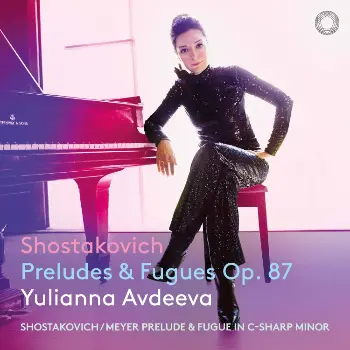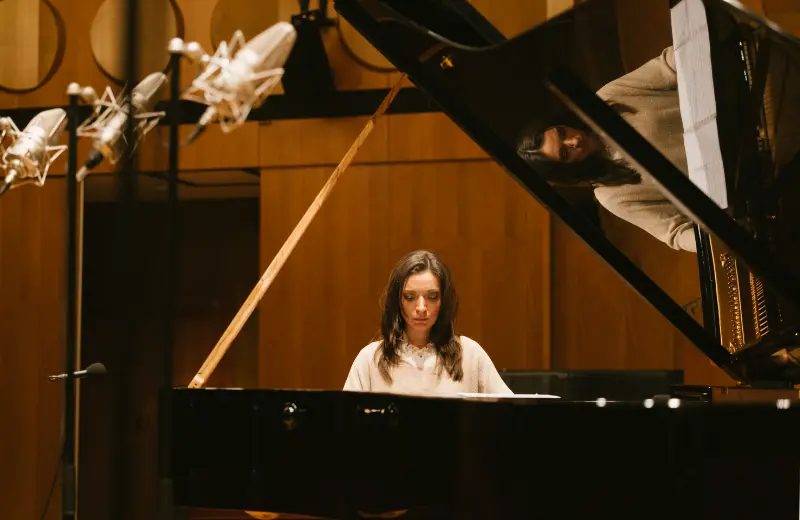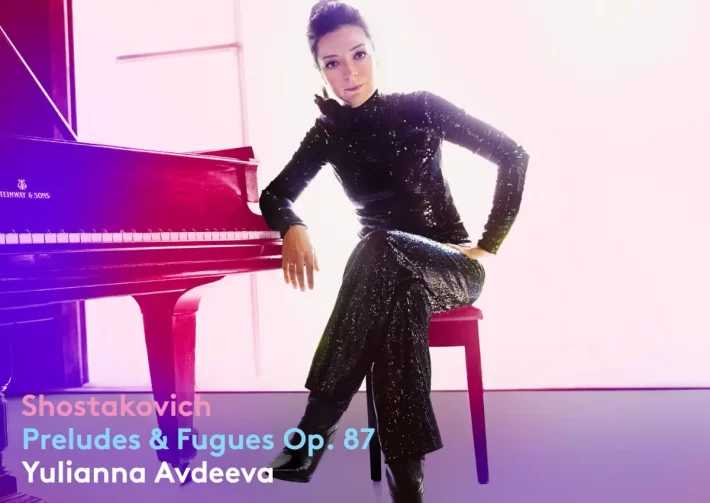Although much of Shostakovich’s music is shrouded in darkness, pianist Yulianna Avdeeva finds that the Op. 87 Preludes and Fugues for piano—which she presents here complete for Pentatone—give us a glimpse into a more comprehensive gamut of moods.

It might not even be fair to say that each prelude and fugue expresses one particular emotion: what makes the opening C major Prelude so interesting, for instance, is its dynamic push-and-pull of sentiments. Avdeeva does a nice job in capturing the interplay between peace and instability: the dissonant harmonic colors are splotched against the main tonality and she makes them more and more stringent as they approach the high point.
In the D major (Disc 1, tracks 9-10). Avdeeva brings Shostakovich’s masterful layering to life. In the mellow Prelude, she creates a gentle, velvety sheen to the chime-like textures, while imbuing the melodies with warmth and depth. Eventually, when these main lines appear in two voices, she engages each in a sensitive dialogue. The Fugue has a bit more of a playful personality, thanks to the recurring staccato motif: while they start shyly enough, Avdeeva cleverly makes them increasingly insistent.
Things take a much stormier turn in the B minor (Disc 1, track 11): the pianist expresses the Prelude’s fury not just through staunch dotted rhythms but adds to the intensity by leaning into the bass notes, which are especially gratifying given the temperament of the instrument’s lower register. By comparison, the Fugue is very much a study in subtlety: Avdeeva makes the contrapuntal voices sound like they’re engaged in whispery, curt commentary—a very different approach compared to the slower-paced, and perhaps more spartan take from Igor Levit (from his On DSCH album reviewed here).
Bringing out the interesting and unexpected dimensions of the music can become something of a hindrance, as heard in the A major prelude (Disc 1, tracks 13), which to me sounds somewhat pale. Tatiana Nikolayeva’s 1962 recording proves more satisfying, as it vividly captures the optimism of the A major sections alongside the sprightly and off-kilter personalities that emerge later on. Avdeeva’s following Fugue is atmospheric, and while initially impressive, soon starts sounding one-dimensional.
In preludes like the E major (Disc 1, track 17) Shostakovich seemed to mimic other keyboard instruments: the way Avdeeva moves the voices in perfect unison and clean sostenutos, the medium in question seems to be an organ. And much like the instrument has a distinctly different character in the upper registers, she indeed creates an intriguing sound profile somewhere between a bell and a flute. This is voicing control of the highest order.

Yulianna Avdeeva (image: © Oliver Killig / Pentatone)
The Shostakovich we’re perhaps more accustomed to — the troubled, discordant, conflicted character— makes an appearance in the Fugue D-flat major (Disc 2, tracks 2). While the Prelude gives us a little hint of the unrest to come via the stark and sardonic interruption, the Fugue’s relentless torrent of strident staccatos still comes as a surprise. The element of urgency may not be as prevalent as in Ashkenazy’s reading, but Avdeeva certainly brings out the madness and chaos.
The B-flat minor Prelude and Fugue (CD 2, 3-4) continues on the darker trend. To me, this is one of the most beautiful and profound works in the cycle. I liked the meandering lyricism of Avdeeva’s performance, but still prefer Levit’s version, whose long melodic lines are richer, better contoured, and also better integrated with the sprawling accompaniment patterns. Profundity appears in the declamatory fugal subject—or at least it should. I found the approach here too fragile, almost as though the melodies might dissipate into the fog. Keith Jarret’s more convincing rendition not only brings greater substance to the melodic lines; it also establishes a captivating balance of austerity and introspection.
Avdeeva is successful in her quest to present different perspectives on Shostakovich through this challenging cycle. Compared to versions by Levit, Ashkenazy, and Nikolayeva, her reading leans toward the nuanced and understated, offering a solid alternative to those more outspoken interpretations. A laudable effort nonetheless.
Recommended Comparisons
Levit | Nikolayeva | Ashkenazy | Melnikov

Album Details |
|
|---|---|
| Album name | Shostakovich – Preludes and Fugues, Op. 87 |
| Label | Pentatone |
| Catalogue No. | PTC5187480 |
| Artists | Yulianna Avdeeva |



















